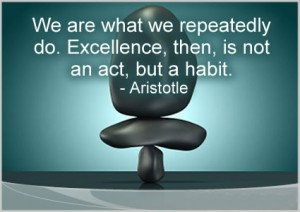Usually by this time of year, many of us lose some of the motivation we have to continue working toward our goals.
Whether the goal was to get through your last remedial course, have excellent attendance and participate in class, or complete all your homework, it’s all a bit much now.
So, how can we create and sustain good habits that can help us push through accomplishing our goals? How can we do things we’re supposed to despite fluctuations in our motivation?
I started thinking about these concepts and the psychology behind developing good habits. It lead me to participate in a week long challenge with Dr. BJ Frogg’s program, Tiny Habits.
For the week, I had to create three tiny goals that would be extremely easy to complete, like floss one tooth (yes, just one) or read for 1 minute. I also had to think about what obstacles were in the way of me accomplishing these goals and not only remove them, but also create opportunities for success. So, for example, one of my goals was one Dr. Fogg recommends and is a Mauian tradition. Every morning touch your feet on the floor and say, “It’s going to be a great day.” I had to make sure I didn’t keep my purse or bags next to my bed and I laid out a yoga mat to remind myself of this tiny habit.
I also set a goal to complete just one math problem a day and read before bed each night, even if only for a minute.
Something incredible happened during the week. Not only did I complete my tiny habits daily, but I also did more than just floss that one tooth. Once I cracked open my book, I completed 5 problems each day instead of 1. And I read on average for 20 minutes.
It felt good to accomplish my goals, no matter how tiny. And when I felt good about it, I wanted to do more of it. So, if you tell yourself that you’ll complete one homework problem from each section, maybe you’ll feel good about accomplishing that and do another and another…you get the picture.
I hope you’ll check out the Tiny Habits site and set some goals of your own. It’s never too late to build good and healthy habits, even if it’s the first step in a thousand mile journey.
